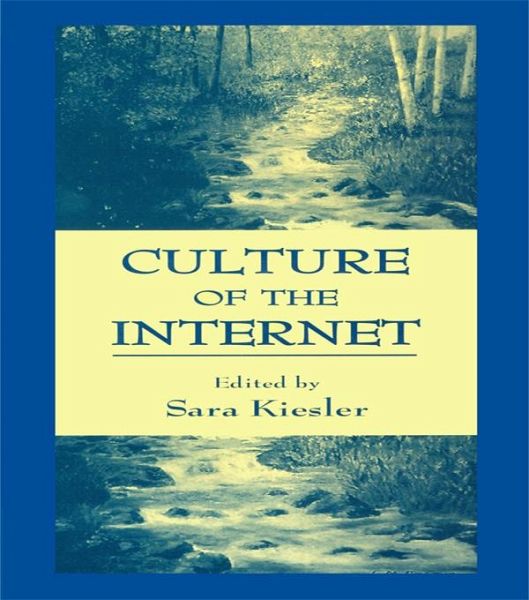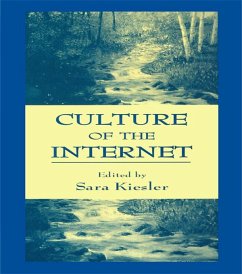
Culture of the Internet (eBook, PDF)
Versandkostenfrei!
Sofort per Download lieferbar
67,95 €
inkl. MwSt.
Weitere Ausgaben:

PAYBACK Punkte
34 °P sammeln!
As we begin a new century, the astonishing spread of nationally and internationally accessible computer-based communication networks has touched the imagination of people everywhere. Suddenly, the Internet is in everyday parlance, featured in talk shows, in special business "technology" sections of major newspapers, and on the covers of national magazines. If the Internet is a new world of social behavior it is also a new world for those who study social behavior. This volume is a compendium of essays and research reports representing how researchers are thinking about the social processes of ...
As we begin a new century, the astonishing spread of nationally and internationally accessible computer-based communication networks has touched the imagination of people everywhere. Suddenly, the Internet is in everyday parlance, featured in talk shows, in special business "technology" sections of major newspapers, and on the covers of national magazines. If the Internet is a new world of social behavior it is also a new world for those who study social behavior. This volume is a compendium of essays and research reports representing how researchers are thinking about the social processes of electronic communication and its effects in society. Taken together, the chapters comprise a first gathering of social psychological research on electronic communication and the Internet.
The authors of these chapters work in different disciplines and have different goals, research methods, and styles. For some, the emergence and use of new technologies represent a new perspective on social and behavioral processes of longstanding interest in their disciplines. Others want to draw on social science theories to understand technology. A third group holds to a more activist program, seeking guidance through research to improve social interventions using technology in domains such as education, mental health, and work productivity. Each of these goals has influenced the research questions, methods, and inferences of the authors and the "look and feel" of the chapters in this book.
Intended primarily for researchers who seek exposure to diverse approaches to studying the human side of electronic communication and the Internet, this volume has three purposes:
* to illustrate how scientists are thinking about the social processes and effects of electronic communication;
* to encourage research-based contributions to current debates on electronic communication design, applications, and policies; and
* to suggest, by example, how studies of electronic communication can contribute to social science itself.
The authors of these chapters work in different disciplines and have different goals, research methods, and styles. For some, the emergence and use of new technologies represent a new perspective on social and behavioral processes of longstanding interest in their disciplines. Others want to draw on social science theories to understand technology. A third group holds to a more activist program, seeking guidance through research to improve social interventions using technology in domains such as education, mental health, and work productivity. Each of these goals has influenced the research questions, methods, and inferences of the authors and the "look and feel" of the chapters in this book.
Intended primarily for researchers who seek exposure to diverse approaches to studying the human side of electronic communication and the Internet, this volume has three purposes:
* to illustrate how scientists are thinking about the social processes and effects of electronic communication;
* to encourage research-based contributions to current debates on electronic communication design, applications, and policies; and
* to suggest, by example, how studies of electronic communication can contribute to social science itself.
Dieser Download kann aus rechtlichen Gründen nur mit Rechnungsadresse in A, B, BG, CY, CZ, D, DK, EW, E, FIN, F, GR, HR, H, IRL, I, LT, L, LR, M, NL, PL, P, R, S, SLO, SK ausgeliefert werden.













